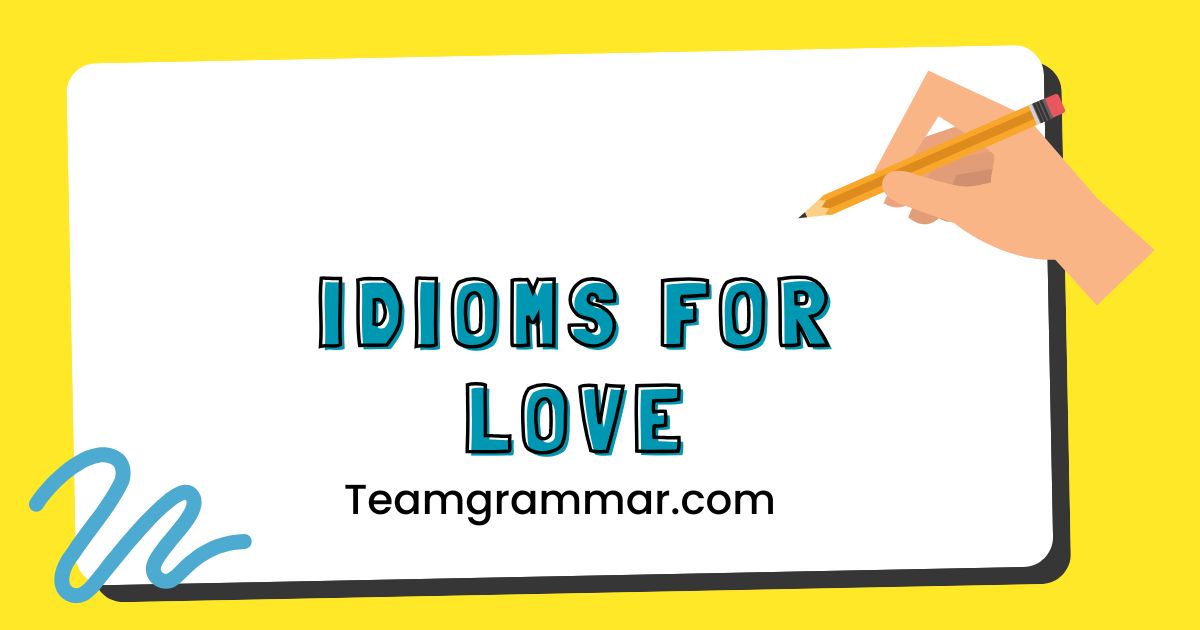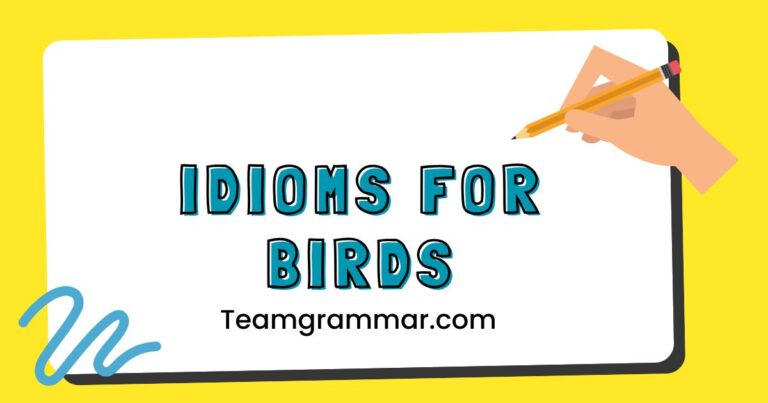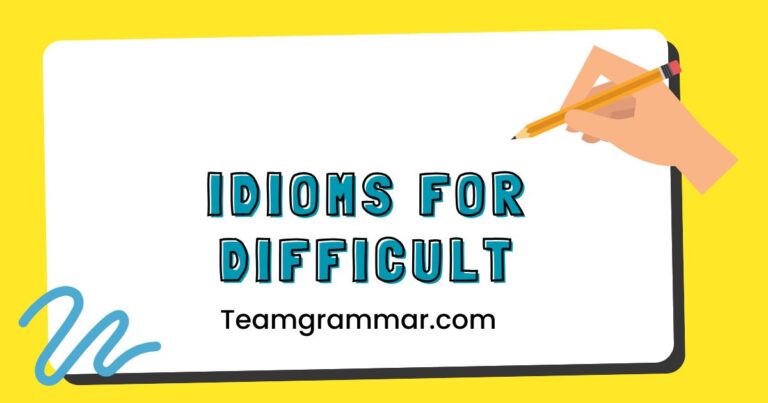31 Idioms for Love: Expressing Affection in English
Love, a universal language, often finds unique expressions through idioms. These colorful phrases add depth and emotion to our conversations, painting vivid pictures of affection, infatuation, and commitment.
Understanding idioms related to love enhances your grasp of the English language, allowing you to communicate more effectively and appreciate the nuances of romantic expression. This article explores a rich collection of idioms about love, breaking down their meanings, origins, and usage, making them accessible to learners of all levels.
Whether you’re writing a love letter or simply want to spice up your daily conversations, mastering these idioms will enrich your linguistic toolkit and deepen your understanding of love’s many facets.
Table of Contents
- Introduction
- Definition of Idioms for Love
- Structural Breakdown
- Types and Categories of Love Idioms
- Examples of Idioms for Love
- Usage Rules for Love Idioms
- Common Mistakes When Using Love Idioms
- Practice Exercises
- Advanced Topics
- Frequently Asked Questions
- Conclusion
Definition of Idioms for Love
Idioms for loveare phrases or expressions whose meaning cannot be understood from the ordinary meanings of the words within them. These idioms are figurative language used to describe various aspects of love, relationships, and emotions associated with them.
They offer a more colorful and expressive way to communicate feelings of affection, infatuation, commitment, heartbreak, and the complexities of romantic relationships. An idiom’s true meaning is derived from cultural usage and shared understanding, making it essential to learn the context in which it is used to avoid misinterpretation.
The function of love idioms is to add depth and emotional resonance to communication. Instead of simply stating a fact, such as “I am very attracted to you,” one might say, “I have a crush on you.” This idiom conveys the same meaning but with a more playful and relatable tone.
Idioms allow speakers to express complex emotions in a succinct and memorable way, often drawing upon shared cultural references and experiences. They are frequently used in literature, poetry, music, and everyday conversation to enrich the language and create a stronger connection between the speaker and the audience.
Love idioms appear in various contexts, ranging from casual conversations to formal writing. You might hear them in romantic comedies, pop songs, or even in advice columns.
In literature, idioms can be used to develop characters, set the tone, and create a sense of realism. Understanding these idioms is crucial for comprehending the emotional subtext of the text.
In everyday conversation, using love idioms can make your speech more engaging and relatable, helping you to express your feelings in a more nuanced and expressive manner. However, it’s important to use them appropriately, considering the audience and the formality of the situation.
Structural Breakdown
The structure of idioms is unique because their meaning is not literal. The individual words, when taken separately, do not convey the overall meaning of the idiom.
Instead, the entire phrase functions as a single unit of meaning. Understanding the structural breakdown of idioms involves recognizing that they often defy standard grammatical rules and conventions.
They are fixed expressions, meaning the words and their order cannot be changed without altering or destroying the idiom’s intended meaning.
Many love idioms follow common structural patterns, such as metaphors, similes, and personification. “Head over heels,” for example, is a metaphor that suggests a complete loss of balance and control due to intense infatuation. “Like two peas in a pod” is a simile that compares two people to identical peas, emphasizing their compatibility and closeness. “Love is blind” is an example of personification, attributing the human characteristic of blindness to the abstract concept of love. These structural elements contribute to the vivid imagery and emotional impact of love idioms.
Idioms often have a historical or cultural origin that explains their unique structure and meaning. For instance, the idiom”tie the knot”comes from the ancient tradition of handfasting, where couples would literally tie their hands together as a symbol of their commitment.
Understanding the historical context can provide valuable insights into the meaning and usage of idioms. Additionally, idioms can evolve over time, with their meanings and usage changing slightly based on cultural shifts and linguistic trends.
Therefore, it’s important to stay updated on the contemporary usage of idioms to avoid miscommunication.
Types and Categories of Love Idioms
Love idioms can be categorized based on the specific aspect of love they describe. This categorization helps in understanding the nuances of each idiom and using it appropriately in different contexts.
Here are some key categories:
Idioms of Infatuation
These idioms describe the initial stages of love, often characterized by intense attraction and excitement. They convey the feeling of being captivated or charmed by someone.
Idioms of Commitment
These idioms refer to the deeper stages of a relationship, where there is a strong bond and a desire for a long-term future together. They often involve promises, loyalty, and shared goals.
Idioms of Affection
These idioms express feelings of fondness, care, and tenderness towards someone. They highlight the emotional connection and the desire to show love and appreciation.
Idioms of Heartbreak
These idioms describe the pain, sadness, and disappointment associated with the end of a relationship. They convey the feeling of loss and emotional distress.
Idioms Describing Relationships
These idioms describe the state of a relationship, its dynamics, and the interactions between the people involved. They can refer to the overall quality of the relationship, its challenges, and its strengths.
Examples of Idioms for Love
Here are detailed examples of love idioms, categorized for clarity and better understanding. Each table includes a variety of idioms with their meanings and example sentences.
Infatuation Examples
The following table provides idioms related to infatuation, describing the initial feelings of attraction and excitement. These idioms capture the sense of being captivated by someone.
| Idiom | Meaning | Example Sentence |
|---|---|---|
| Have a crush on someone | To be infatuated with someone. | She has a crush on the new student in her class. |
| Be smitten with someone | To be suddenly and strongly attracted to someone. | He was completely smitten with her from the moment they met. |
| Head over heels | Deeply and madly in love. | They fell head over heels for each other during their summer vacation. |
| Carry a torch for someone | To be secretly in love with someone, often unrequited. | Even after all these years, he still carries a torch for his high school sweetheart. |
| Love at first sight | Falling in love immediately upon meeting someone. | It was love at first sight when she saw him across the crowded room. |
| Have eyes only for someone | To be exclusively attracted to one person. | He has eyes only for her, even though many other women are interested in him. |
| Be sweet on someone | To be romantically interested in someone. | He’s been sweet on her ever since they started working together. |
| Be taken by someone | To be charmed or captivated by someone. | She was taken by his intelligence and sense of humor. |
| Fall for someone | To start to love someone. | I started to fall for him after our first date. |
| Sweep someone off their feet | To cause someone to fall suddenly and deeply in love. | He swept her off her feet with his romantic gestures. |
| Be all over someone | To show a lot of physical affection to someone, often publicly. | They were all over each other at the party, clearly very much in love. |
| Get butterflies in your stomach | To feel nervous and excited when thinking about or seeing someone. | She always gets butterflies in her stomach whenever he texts her. |
| Be moonstruck | To be romantically dreamy and impractical. | He was completely moonstruck after their romantic evening together. |
| Be lovesick | To feel ill or miserable because you are in love and cannot be with the person you love. | She was lovesick for weeks after he moved away. |
| Catch someone’s eye | To attract someone’s attention and interest. | He first caught her eye when he volunteered to help her with her project. |
| Make someone’s heart flutter | To make someone feel excited and nervous with romantic feelings. | His compliments always make her heart flutter. |
| Have a soft spot for someone | To feel affection or fondness for someone. | She has a soft spot for him because he always makes her laugh. |
| Be infatuated with someone | To have a strong but often short-lived passion or admiration for someone. | He was infatuated with the actress after seeing her perform on stage. |
| Be captivated by someone | To be attracted and held by someone’s charm or beauty. | She was captivated by his storytelling. |
| Take a fancy to someone | To develop a liking or attraction to someone. | He took a fancy to her after their first conversation. |
| Go gaga over someone | To be extremely enthusiastic and excited about someone. | She’s been going gaga over him ever since they met. |
| Adore the ground someone walks on | To greatly admire and love someone. | He adores the ground she walks on; he thinks she’s perfect. |
| Be mad about someone | To be very fond of or in love with someone. | She’s mad about him and can’t stop talking about him. |
Commitment Examples
This table showcases idioms related to commitment, highlighting the deeper bonds and long-term promises in a relationship. These expressions convey loyalty, dedication, and shared goals.
| Idiom | Meaning | Example Sentence |
|---|---|---|
| Tie the knot | To get married. | They decided to tie the knot after dating for five years. |
| Pop the question | To propose marriage. | He’s planning to pop the question on their anniversary. |
| Take the plunge | To make a big decision, especially getting married. | They’re ready to take the plunge and start a family. |
| Settle down | To start living a more stable and conventional life, often involving marriage and a family. | After years of traveling, they decided to settle down in a small town. |
| Walk down the aisle | To get married. | She’s dreamed of walking down the aisle since she was a little girl. |
| Become an item | To start a romantic relationship. | They became an item after their romantic getaway. |
| Make a commitment | To pledge to a long-term relationship. | They’re ready to make a commitment to each other. |
| Put a ring on it | To propose marriage. | He finally put a ring on it after years of dating. |
| Seal their love | To make a formal promise of love, often through marriage. | They sealed their love with a beautiful wedding ceremony. |
| Grow old together | To spend the rest of one’s life with someone. | They dream of growing old together, side by side. |
| Be each other’s rock | To be a source of support and stability for each other. | Through thick and thin, they have always been each other’s rock. |
| Be in it for the long haul | To be committed to a relationship for the long term. | They’re in it for the long haul, no matter what challenges they face. |
| Pledge allegiance to someone | To promise loyalty and devotion to someone. | He pledged allegiance to her, promising to always be there for her. |
| Vow to be together forever | To make a solemn promise to stay together for life. | They vowed to be together forever during their wedding vows. |
| Join hands in marriage | To get married, symbolizing unity and partnership. | They joined hands in marriage in a beautiful outdoor ceremony. |
| Build a life together | To create a shared future, including home, family, and experiences. | They are excited to build a life together, starting with buying their first home. |
| Start a family | To have children and create a family unit. | They are planning to start a family next year. |
| Cement their relationship | To strengthen a relationship, making it more stable and secure. | Having children helped to cement their relationship. |
| Make an honest woman out of someone | (Traditional) To marry a woman, giving her social respectability. | He decided it was time to make an honest woman out of her. |
| Give someone a ring | To propose marriage. | He decided to give her a ring on Valentine’s Day. |
| Be joined at the hip | To be very close and inseparable. | They are joined at the hip and do everything together. |
| Become one | To unite in marriage, symbolizing a new shared identity. | They became one in a beautiful ceremony surrounded by family and friends. |
| Be each other’s soulmate | To believe that two people are perfectly suited for each other. | They believe they are each other’s soulmate and were destined to be together. |
Affection Examples
The following table illustrates idioms that express affection, showing fondness, care, and tenderness in a relationship. These idioms highlight emotional connections and the desire to show love.
| Idiom | Meaning | Example Sentence |
|---|---|---|
| Be the apple of someone’s eye | To be someone’s favorite person. | She is the apple of her grandfather’s eye. |
| Think the world of someone | To have a very high opinion of someone, often with affection. | He thinks the world of his wife. |
| Have a special place in someone’s heart | To be deeply loved and cherished by someone. | She will always have a special place in his heart. |
| Hold someone near and dear | To cherish and love someone deeply. | He holds his family near and dear. |
| Be close to someone’s heart | To be someone who is deeply loved and significant. | Her children are close to her heart. |
| Cherish someone | To protect and care for someone lovingly. | He cherishes every moment they spend together. |
| Adore someone | To love and admire someone greatly. | She adores her grandchildren. |
| Worship the ground someone walks on | To admire and love someone excessively. | He practically worships the ground she walks on. |
| Spoil someone rotten | To give someone everything they want, often excessively. | They spoil their children rotten. |
| Dote on someone | To show excessive love and affection towards someone. | She dotes on her new puppy. |
| Be someone’s everything | To be the most important person in someone’s life. | They are each other’s everything. |
| Treasure someone | To value and appreciate someone greatly. | He treasures their friendship. |
| Value someone | To consider someone important and worthy of respect and affection. | They value each other’s opinions. |
| Hold someone in high regard | To have great respect and admiration for someone. | She holds him in high regard. |
| Think highly of someone | To have a positive opinion and respect for someone. | He thinks highly of her work ethic. |
| Have a soft spot for someone | To feel affection or fondness for someone. | She has a soft spot for him because he’s always been kind. |
| Be fond of someone | To have a liking or affection for someone. | He is very fond of her sense of humor. |
| Care deeply for someone | To have strong feelings of affection and concern for someone. | She cares deeply for her family. |
| Be attached to someone | To form an emotional bond with someone. | He is very attached to his pet cat. |
| Be devoted to someone | To be very loyal and loving towards someone. | She is completely devoted to her husband. |
| Give the shirt off your back | To be extremely generous and willing to help someone. | He would give the shirt off his back to help a friend in need. |
| Go the extra mile | To do more than what is expected or required for someone. | She always goes the extra mile to make her guests feel welcome. |
| Be there for someone | To provide support and comfort to someone in times of need. | He is always there for her when she needs him. |
Heartbreak Examples
This table presents idioms related to heartbreak, describing the pain, sadness, and disappointment of a broken relationship. These expressions convey feelings of loss and emotional distress.
| Idiom | Meaning | Example Sentence |
|---|---|---|
| Have a broken heart | To feel extreme sadness and grief due to the end of a romantic relationship. | She has a broken heart after their breakup. |
| Wear your heart on your sleeve | To openly show your emotions, especially romantic feelings. | He wears his heart on his sleeve, so everyone knows how he feels. |
| Die of a broken heart | To suffer so much from grief that it feels like one is dying. | She felt like she would die of a broken heart when he left. |
| Cry your eyes out | To cry intensely and for a long time. | She cried her eyes out after the argument. |
| Be down in the dumps | To feel sad and depressed. | He’s been down in the dumps since they broke up. |
| Be torn apart | To be deeply distressed and emotionally wounded. | They were torn apart by the separation. |
| Go through a rough patch | To experience a difficult period in a relationship. | They’re going through a rough patch right now. |
| Hit the rocks | To encounter serious problems that threaten a relationship. | Their marriage hit the rocks after the affair. |
| Go sour | To deteriorate or become unpleasant, especially in a relationship. | Their relationship went sour after a few months. |
| Be on the rocks | To be in a state of difficulty or uncertainty, especially in a relationship. | Their marriage is on the rocks. |
| Call it quits | To end a relationship or partnership. | They decided to call it quits after years of fighting. |
| Split up | To end a romantic relationship. | They split up last month. |
| Break up | To end a romantic relationship. | They broke up after a long and difficult discussion. |
| Go your separate ways | To end a relationship and live different lives. | They decided to go their separate ways. |
| Be left at the altar | To be abandoned by one’s fiancé(e) just before the wedding. | She was left at the altar on her wedding day. |
| Be jilted | To be rejected or abandoned by a lover. | He was jilted by his girlfriend. |
| Nurse a broken heart | To recover from the emotional pain of a failed relationship. | She’s trying to nurse her broken heart by traveling. |
| Get over someone | To recover from a romantic relationship. | It’s hard to get over someone you loved deeply. |
| Mend a broken heart | To heal from the emotional pain of a broken relationship. | Time can mend a broken heart. |
| Pick up the pieces | To recover and rebuild one’s life after a difficult experience. | She’s trying to pick up the pieces after the divorce. |
| Sing the blues | To feel sad or depressed. | He’s been singing the blues since she left. |
| Have a heavy heart | To feel sad and burdened with grief. | She has a heavy heart after the funeral. |
| Be heartbroken | To be extremely sad and emotionally devastated. | He was heartbroken when she told him she didn’t love him anymore. |
Relationship Examples
This table includes idioms describing the state of a relationship, its dynamics, and the interactions between the people involved. These expressions can refer to the overall quality of the relationship, its challenges, and its strengths.
| Idiom | Meaning | Example Sentence |
|---|---|---|
| Be like two peas in a pod | To be very similar and close to each other. | They are like two peas in a pod; they do everything together. |
| Get on like a house on fire | To have a very good and harmonious relationship. | They get on like a house on fire whenever they meet. |
| See eye to eye | To agree with someone completely. | They don’t always see eye to eye, but they respect each other’s opinions. |
| Be on the same wavelength | To understand and agree with each other easily. | They are on the same wavelength and understand each other without speaking. |
| Be a match made in heaven | To be a perfectly compatible couple. | They are a match made in heaven. |
| Be an item | To be romantically involved. | They became an item after the school dance. |
| Have a thing for someone | To be attracted to someone. | He has a thing for her. |
| Have a rocky relationship | To have a relationship with many difficulties and arguments. | They have a rocky relationship, but they always work things out. |
| Be on the outs with someone | To be on bad terms with someone. | They’re on the outs with each other after the argument. |
| Be thick as thieves | To be very close friends and share secrets. | They are thick as thieves and tell each other everything. |
| Be joined at the hip | To be very close and inseparable. | They are joined at the hip and do everything together. |
| Have an open relationship | To have a relationship where both partners agree to have sexual relationships with others. | They have an open relationship that works for them. |
| Be a couple | To be in a romantic relationship. | They are a couple and have been dating for two years. |
| Go steady | To have a regular romantic relationship with someone. | They have been going steady since high school. |
| Be in a relationship | To be romantically involved with someone. | They are in a relationship and are very happy. |
| Be seeing someone | To be dating someone regularly. | She’s seeing someone new. |
| Play the field | To date multiple people at the same time without committing to anyone. | He’s playing the field and enjoying his single life. |
| Be on the rebound | To be in a relationship shortly after the end of a previous significant relationship. | She’s on the rebound after her breakup. |
| Carry the flame for someone | To still have feelings for someone from a past relationship. | He still carries the flame for his ex-girlfriend. |
| Rekindle the flame | To revive or renew a past romantic relationship. | They tried to rekindle the flame but it didn’t work out. |
| Keep someone at arm’s length | To avoid becoming too close or emotionally involved with someone. | She keeps him at arm’s length because she’s afraid of getting hurt. |
| Put someone on a pedestal | To admire or idealize someone excessively. | He puts her on a pedestal and sees her as perfect. |
| Be tied to someone’s apron strings | To be overly dependent on someone, especially one’s mother. | He’s still tied to his mother’s apron strings. |
Usage Rules for Love Idioms
Using love idioms correctly requires understanding their specific meanings and contexts. Here are some key rules to follow:
- Understand the Meaning: Make sure you know the precise meaning of the idiom before using it. Misusing an idiom can lead to confusion or miscommunication.
- Consider the Context: Use idioms that are appropriate for the situation. Some idioms are casual, while others are more formal.
- Know Your Audience: Be aware of your audience’s familiarity with idioms. If you’re speaking to non-native speakers, it’s best to use idioms sparingly or explain their meanings.
- Avoid Overuse: Using too many idioms can make your speech sound unnatural or forced. Use them sparingly to add color and emphasis.
- Don’t Change the Words: Idioms are fixed expressions, so avoid changing the words or their order. Changing an idiom can alter its meaning or make it nonsensical.
Exceptions to these rules are rare, but sometimes idioms can be slightly modified for humorous effect or to fit a specific situation. However, this should be done with caution and only when you’re confident that the meaning will still be understood.
Common Mistakes When Using Love Idioms
Here are some common mistakes to avoid when using love idioms:
| Incorrect | Correct | Explanation |
|---|---|---|
| “I have a crush with him.” | “I have a crush on him.” | The correct preposition is “on,” not “with.” |
| “They fell heads over heels.” | “They fell head over heels.” | The correct idiom is “head over heels,” not “heads over heels.” |
| “She is the apple of his eyes.” | “She is the apple of his eye.” | The correct idiom is “apple of his eye,” not “apple of his eyes.” |
| “They tied the rope.” | “They tied the knot.” | The idiom is “tie the knot,” which means to get married. |
| “He popped a question.” | “He popped the question.” | The correct idiom is “pop the question,” which means to propose marriage. |
| “They see face to face.” | “They see eye to eye.” | The idiom is “see eye to eye,” meaning to agree. |
| “She carries a light for him.” | “She carries a torch for him.” | The correct idiom is “carry a torch,” meaning to have unrequited love. |
| “He’s all over her head.” | “He’s head over heels for her.” | The idiom is “head over heels,” meaning deeply in love. |
Practice Exercises
Test your understanding of love idioms with these exercises:
Advanced Topics
For advanced learners, consider exploring the etymology and historical context of love idioms. Understanding where these expressions come from can provide deeper insights into their meanings and cultural significance.
Additionally, explore how love idioms are used in different genres of literature, music, and film. Analyze how authors and artists use these idioms to convey complex emotions and themes.
Another advanced topic is the comparison of love idioms across different languages and cultures. While some idioms may have direct equivalents in other languages, many are unique to a specific culture.
Comparing these idioms can reveal interesting differences in how love and relationships are perceived and expressed in different parts of the world.
Frequently Asked Questions
Conclusion
Love idioms offer a colorful and expressive way to communicate feelings and emotions related to love and relationships. By understanding the meanings, origins, and usage rules of these idioms, you can enhance your English language skills and express yourself more effectively.
Whether you’re describing the excitement of infatuation, the depth of commitment, or the pain of heartbreak, love idioms provide a rich and nuanced vocabulary for expressing the complexities of the human heart. Keep practicing and exploring new idioms to continue expanding your linguistic toolkit and enriching your understanding of love’s many facets.







